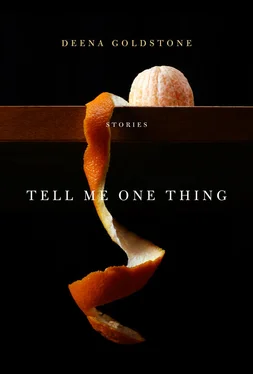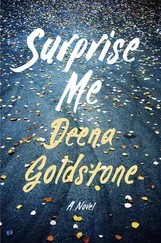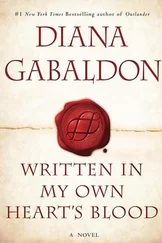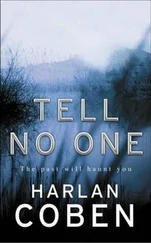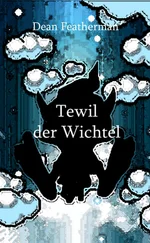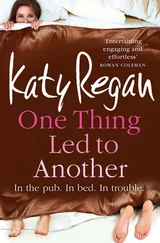I said yes although I never drank tea. I said yes because he still seemed upset. I said yes because I didn’t want to leave.
We sat at his round dining room table in the two mismatched chairs. Bandit slept at Owen’s feet, snoring slightly from time to time. The tea Owen made us was some kind of herbal concoction and I didn’t like it, but I sipped it anyway.
“What do you do with the rest of your time?” Owen asked me.
“I walk other people’s dogs.”
“And when you’re not doing that?”
I hesitated. My morning hours at my desk were so sequestered from the rest of my life I wasn’t sure I wanted to tell him, and so I was slow to answer.
“Is it illegal?”
And that made me laugh. “No, just fragile,” I said.
And he nodded as if he understood. “Just being born?”
“Yes.”
“And each day, you’re not sure it won’t all collapse and there you will be, back where you started without anything to show for all your effort.”
I just looked at him without answering — how did he get inside my head?
“Can you tell me what it is?”
He was looking directly at me as he spoke, his brown eyes never left my face. He was wearing a blue shirt, I remember, bright blue with the cuffs rolled up on strong forearms. His body leaned forward over the table and his naked hands cupped his mug of tea. He was waiting with infinite patience. The rest of the world receded to the periphery of my consciousness and in that moment there was only the two of us sitting in this high-ceilinged room looking at each other. It unnerved me — the intensity of his interest, the answering pull within me that I suddenly recognized. What was happening here?
I stood up quickly, took my mug of tea to the kitchen sink, and only then managed to say, without looking at him, trying to keep my voice light, “Oh, I’m messing about trying to write some short stories.”
He followed me into the kitchen. “Exciting, isn’t it?”
“Sometimes … when I get it right.” Then the truth: “Yes, it is.” And we smiled at each other.
THAT DAY SHIFTED OUR ROUTINE, imperceptibly, but definitely. After that, oftentimes if he wasn’t on the phone, we would sit at Owen’s oak table and drink tea, and then coffee when I finally confessed that caffeine was my lifeline, and we would talk. He seemed to be home more often, and I made sure I had no dogs waiting for me in the early afternoon.
What did we talk about? At first it was our work lives. I learned about the nonprofit, Art into Life, that convinced him to come back to California and fund-raise for them. Their mission was to pair working artists — writers, painters, poets, architects, photographers — with afterschool programs in the city schools. It was a way for kids who had never been to a museum or read a book that wasn’t assigned in school to see, learn, and try out their creative wings. The organization was in its third year of operation, long enough to convince the community that they were viable, but not yet at the stage to make the kind of impact they envisioned. That’s where Owen came in.
Living and working in New York, Owen had been employed by a small family foundation that gave out yearly grants to carefully chosen artists, three or four at a time. The last awards had gone to a weaver who created wall hangings from used denim, a glass artist who constructed Tiffany-style lamps, and a conceptual artist who used found sites — an abandoned gas station, a crumbling factory — to stage his work. All very well and good, Owen said, supporting an individual artist’s work, but when this job came to him he decided reaching kids at an early age was an even better idea, and he came back to L.A. where he had lived before, and reclaimed the house he had been renting out.
I wondered if the person who had broken into the house had been his renter, communicating something like You made me leave with those wine bottles arranged in an arrow and pointing out the window. Whoever did it was angry, that much was clear.
But I didn’t ask. There seemed to be an implicit etiquette to those early conversations. Each of us spoke about what we wanted the other to know. And each of us listened and accepted and didn’t probe. It worked. A sense of shelter grew, a sense of being heard but not challenged.
When we sat in that quiet dining room in the early afternoon, the sun coming in through the westward-facing windows, I felt safe enough to talk about the work I had done that morning at my desk or even the struggle I’d put up with nothing to show for it. Owen was the only person in my life then who knew about my writing.
My parents, who lived in Pleasanton, in Northern California, would call dutifully every Sunday night and, from time to time, carefully raise the question of what I was planning on doing with my life. It was my mother who would always preface her inquiry with “I know the first few years after graduation are for figuring out what you want to do,” and then my father, on the extension, would jump in and remind me of how expensive my UCLA education had been. There was no way I could ameliorate the fact that their college-educated daughter was spending her days taking dogs for a walk and picking up poop without telling them about the writing. And I wasn’t ready to do that. My father, who was a scientist and worked at the neighboring Lawrence Liver-more National Laboratory doing something with national defense contracts that he couldn’t ever completely explain to us, would have dismissed a literary career as a pipe dream. My mother, who had spent her career as a middle-school counselor in the Alameda County School System, would have worried about the amount of rejection I would have to suffer.
But with Owen, the words rushed out of my mouth. “I had a good morning!” I would say as we sat down. And he would put the two mugs of coffee on the table, sit down across from me, and say, “Tell me,” as if he hadn’t anywhere else to be or anything else to do. “Tell me everything”—as if my progress made him personally happy, as if he had a stake in it. And so I would. I have never had a traditional mentor in my life, but those early afternoons with Owen were as close as I ever got.
That’s where things rested for months. I walked Bandit five days a week. Owen and I had our midday coffee in his dining room when he was home. He listened eagerly and because I was so hungry to share my early morning secret, I was the one who talked and talked. Over those months I learned very little about his life until late one Thursday night, after midnight, when my phone rang, startling me awake. Owen sounded frantic.
“Bandit’s gone” were his first words. I wasn’t fully awake. I didn’t quite understand.
“Gone where?”
“I just got home and he’s not here and the backyard gate is open.”
“I’m sure I didn’t—” I started to say.
“No, of course not,” he cut me off, “I didn’t mean to imply. I just picked up the phone without thinking.” I heard him take a deep breath and then another. “I woke you,” he said, sounding only minimally calmer. “I’m sorry, Anna. What can you do? Please, go back to sleep.”
“I’ll be there in ten minutes.”
WHEN I PULLED UP TO OWEN’S HOUSE, the kitchen and dining room lights were blazing. I could see him pacing as I let myself in through the back door.
“I walked the streets calling him but it’s dark and he’s black and …” He sat down at the table. “Nothing.”
“Has he done this before? Gotten out?”
“Never.”
“Let’s try again. We’ll take the car. You drive and I’ll look — we can cover more area that way.”
Slowly Owen drove the dark streets of his neighborhood. The streetlights were dim and far apart, yielding only modest pools of amber light here and there. Most of the small houses were dark by now as well. It was close to one in the morning.
Читать дальше
